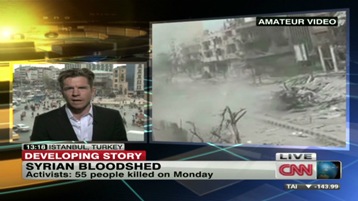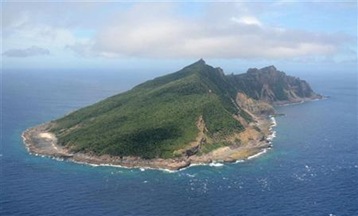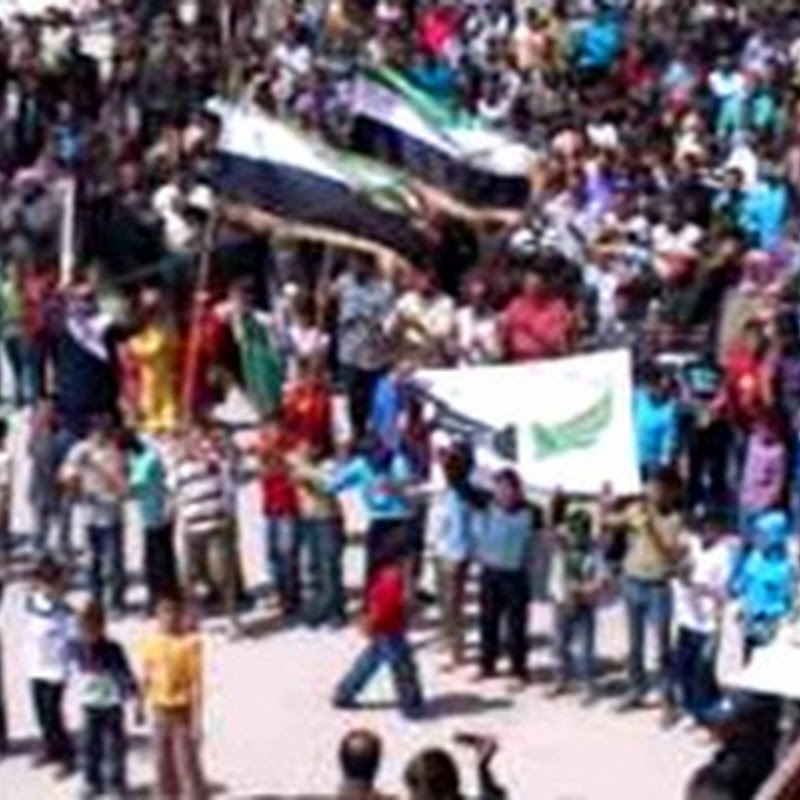 The beginning of the U.N. observer mission to Syria heralds a new phase in more than a year of upheaval across the country. Success, however unlikely, could open the door to some form of dialogue between the regime and its opponents. But such is the polarization in Syria that most analysts see the mission as the least worst option before violence sets the agenda again.
The beginning of the U.N. observer mission to Syria heralds a new phase in more than a year of upheaval across the country. Success, however unlikely, could open the door to some form of dialogue between the regime and its opponents. But such is the polarization in Syria that most analysts see the mission as the least worst option before violence sets the agenda again.
It's not as though any "cessation of violence" has yet taken hold. The ceasefire was meant to begin last Thursday, but in the past few days the regime has continued to shell restive city neighborhoods, according to opposition activists and U.N. officials. U.N. human rights officials reported Monday "the shelling of the Khalidiya neighborhood and other districts in Homs by government forces and the use of heavy weaponry, such as machine-guns in other areas, including Idlib and some suburbs of Damascus."
One of the most important parts of the plan devised by Kofi Annan is that tanks, troops and heavy weapons be withdrawn from populated areas, but this has clearly not happened.
Monitoring missions can only work when the parties to a conflict have had enough of fighting or can be coerced into negotiation by outside powers. The Arab League mission members in Syria earlier this year were little more than bystanders, unable or unwilling to operate amid the government crackdown.
Twenty years ago, the U.N. agreed to deploy a mission to monitor a ceasefire in Sarajevo, the besieged capital of Bosnia. But the ceasefire never took hold as both Serbs and Muslims quarreled over its terms. Aid convoys were attacked and looted as U.N. monitors looked on.
By the middle of 1992, more than a million Bosnians were homeless, similar to the number of Syrians displaced today. Despite the subsequent expansion of the U.N. presence in Bosnia, there was no mandate for more forceful intervention until the Srebrenica massacre -- more than three years after the conflict began.
The parallels are not exact but "there is a certain deja vu quality" to events in Syria, admits Ahmad Fawzi, spokesman for Annan.
"The United States is leaving it in the hands of Kofi Annan, as is the rest of the world," Fawzi told McClatchy newspapers. "We're the only path in town. There is no alternative." That in itself illustrates how few options there are for the West to influence events in Syria.
It seems that both Russia and the United States are already preparing for the mission's failure. Russian Foreign Minister Sergei Lavrov said Tuesday that some foreign powers hoped to scupper the Annan plan by smuggling weapons to the rebels, while U.S. Ambassador to the United Nations Susan Rice says that regime infractions "will call into question the wisdom and the viability of sending in the full monitoring presence."
Even the terms of the U.N. monitors are still a matter of dispute. U.N. Secretary General Ban Ki-moon said Monday that the government must guarantee freedom of access. The monitors "should be allowed to freely move to any places where they will be able to observe this cessation of violence," he said.
The government has made it clear that the observers won't have free rein and it "will be involved in all steps on the ground." It's also demanding that rebels lay down their weapons, which one opposition activist said was like telling them to write a suicide note.
Even 250 monitors -- the maximum currently envisaged -- would be hard pressed to cover all Syria's hotspots, as Ban himself acknowledged Tuesday.
If it took hold, the presence of U.N. observers might, ironically, provide a respite for both sides. Syria's military has seen a year of relentless operations (and growing defections). The Syrian Free Army has been on the back foot, short of weapons and training. One FSA commander acknowledged he was preparing for the next stage on the assumption the Annan mission would fail.
According to Annan's six-point plan, the Syrian government would have to make significant concessions -- allowing the international media into the country, releasing detainees and allowing peaceful protest. It has shown no sign of making such concessions. The protest movement has endured for months despite arbitrary killings, detention and torture. In a state renowned for its secret police, the shackles of fear were broken and cannot be clamped on again. So for the regime to give free rein to protest would be tantamount to giving up control of sizable cities like Homs, Hama and Idlib. In such places Local Coordination Committees set up by the opposition have already become mini-governments, organizing food deliveries, providing shelter, settling disputes. In addition, the size of an international humanitarian aid effort also mandated by U.N. resolution would de facto deprive the regime of the control it has struggled to reassert.
The arrival of the U.N. monitors does nothing to change the endgame in Syria, which is essentially about the survival of the al-Assad regime. Russia and al-Assad's ally, Iran, apparently believe that Syria can weather the storm; Europe, Turkey and the United States that it is ultimately doomed. The Syrian government appears to have calculated that by accepting if not adhering to the U.N. plan -- for now -- it can alleviate the pressure on it, and that its concessions won't tip the balance toward its opponents, who are disorganized, divided and lack the weapons to challenge the security apparatus.
Also in the regime's calculations, presumably, is that even if it has to resort to plan A, bludgeoning the revolt, the international community is too divided to contemplate military action. The International Crisis Group noted last week: "The West remains confused and ambivalent, having exhausted all sources of diplomatic and economic leverage, fearful of the future and tiptoeing around the question of military options."
Qatar and Saudi Arabia have spoken of arming the opposition, but have not followed through with the sort of hardware and cash that made a difference on the battlefield in Libya.
Looming over the tactical considerations of all sides is the very real damage done to the Syrian economy and people, with the U.N. estimating at least 1 million people displaced internally (not least because sectarian animosities have grown.) Nearly 100,000 Syrians have taken refuge in Jordan. Across the border with Turkey, the refugee camps are taking on a permanent air. Few of the thousands who fled expect to go home anytime soon, and the Obama administration continues to study a buffer zone on the Syria-Turkey border.
If the al-Assad dynasty is to survive, it will need a massive infusion of aid to repair infrastructure and revive an economy in freefall. Defectors have told CNN that government spending has largely been diverted to the military and the feared regime militia; there are shortages of gasoline and electricity. The value of the Syrian pound has halved and a shortage of hard currency is making imports difficult to finance. Reuters quotes French diplomatic sources as estimating Tuesday that Syria's hard currency reserves have dropped 50% in a year as sanctions have hurt the banking sector and the oil industry. In the long-term, against a background of hyperinflation and shortages, economic implosion may be the Syrian state's greatest threat.
But does the government have the will or capacity to repair the damage and deliver economic recovery? And would anyone help it do so?
Not while it's locked in a polarizing war of attrition, characterized by the massacre of entire families and bubbling sectarian hatred. As the International Crisis Group observed last week: "The fact is that the regime's behavior has fueled extremists on both sides, and, by allowing the country's slide into chaos, provided them space to move in and operate."
To most commentators, 250 blue berets are unlikely to reverse that dynamic.








